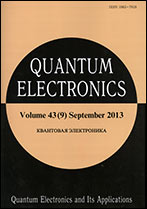|
Active media
Inversionless radiation amplification by ions having certain velocities in a magnetic field
A. I. Parkhomenko
Institute of Automation and Electrometry, Siberian Branch of Russian Academy of Sciences, Novosibirsk
Abstract:
It is shown that the imposition of external magnetic field on a gas of ionised particles may give rise to inversionless radiation amplification by the ions having certain velocities, which is due to their Larmor rotation. In this case, the majority of ions may reside in the ground state. The integrated absorption coefficient remains positive due to an increase in the radiation absorption by the other half of ions.
Received: 22.10.2001
Citation:
A. I. Parkhomenko, “Inversionless radiation amplification by ions having certain velocities in a magnetic field”, Kvantovaya Elektronika, 32:4 (2002), 285–288 [Quantum Electron., 32:4 (2002), 285–288]
Linking options:
https://www.mathnet.ru/eng/qe2184 https://www.mathnet.ru/eng/qe/v32/i4/p285
|


|





 Contact us:
Contact us: Terms of Use
Terms of Use
 Registration to the website
Registration to the website Logotypes
Logotypes








